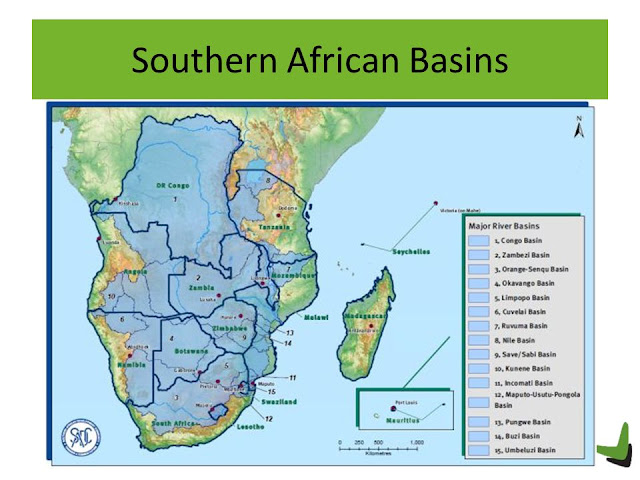Causes of political water insecurity in Africa: PART II
On the other
side of the story, environmental change is also effecting water security due to
social and political factors. Migration of people in search of better lives, in
particular economically viable employment, leads to locations that are arguably
water secure, becoming increasingly water insecure due to increased demand on surface and groundwater supplies. A paper that is the basis for this point is
'Migration and its interdependencies with water scarcity, gender and youth employment' (Miletto et al. 2017). It highlights that 95% of water dependent jobs are based in Agriculture (UNESCO WWAP, 2016), with this agriculture
providing a large proportion of the employment opportunities available to
locals, thus any change to the validity of many jobs can have significant
consequences for the individuals that work those jobs. Countries such as Niger,
that have a very low capacity to adapt to the issues stemming from the negative
externalities of climate change are forced to migrate in search of employment due
to water-scarcity decreasing income generation opportunities. It
is this migration of often young men, that causes social and political water
insecurity in nations that are often not directly affected by the environmental
change themselves. Migration into Nigeria for example is causing water
insecurity, with the latest figures highlighting that "the number of migrants residing in Nigeria has more then doubled in recent decades" with the majority coming from the neighbouring ECOWAS countries, such as Niger (WMR, 2015). Figure 1.1 shows a similar chart to the one we looked at in our last blog. In this context it highlights how climate-related drivers are leading to the key risk of social and political issues, of which is facilitated in Nigeria as the grossly inadequate distribution of water resources, even though the country does not face any significant physical water insecurity (IPCC, 2007).
However, Nigeria does not face water insecurity due to primarily physical factors such as environmental change; it is the pressure of migration forced by environmental change that is causing the political water insecurity in the country. For instance, many of the 36 states are named after rivers highlighting its positive perception of water, with over 215 cubic kilometers of surface water available. However, even though Nigeria is not experiencing water insecurity due to environmental change, pressures of environmental change in other nations forcing economically led migration into this country is forcing politically exacerbated water insecurity. Only 19% of Nigerians has access to "safedrinking water" (WHO, 2016). This highlights that the political fragilities in the form of "poor regulatory, legal and institutional frameworks" (Odume & Slaughter, 2017) of the Nigerian government is at-least partially contributing to the water-scarcity issues facing its population. So, combine this fragility with increasing economic and social migration into Nigeria, then you can start to see why this relatively water abundant nation is experiencing these sort of water deficits highlighted above. This highlights clearly that environmental factors not only cause physical water insecurity, but also contribute to significant water deficits in areas that are not experiencing water insecurity due to political mismanagement of the resource; with migration adding to the demand burden on the water supplies of the country.
 |
| Social/political risks associated with water insecurity caused by climate-related forcing factors - IPCC (2014) |
However, Nigeria does not face water insecurity due to primarily physical factors such as environmental change; it is the pressure of migration forced by environmental change that is causing the political water insecurity in the country. For instance, many of the 36 states are named after rivers highlighting its positive perception of water, with over 215 cubic kilometers of surface water available. However, even though Nigeria is not experiencing water insecurity due to environmental change, pressures of environmental change in other nations forcing economically led migration into this country is forcing politically exacerbated water insecurity. Only 19% of Nigerians has access to "safedrinking water" (WHO, 2016). This highlights that the political fragilities in the form of "poor regulatory, legal and institutional frameworks" (Odume & Slaughter, 2017) of the Nigerian government is at-least partially contributing to the water-scarcity issues facing its population. So, combine this fragility with increasing economic and social migration into Nigeria, then you can start to see why this relatively water abundant nation is experiencing these sort of water deficits highlighted above. This highlights clearly that environmental factors not only cause physical water insecurity, but also contribute to significant water deficits in areas that are not experiencing water insecurity due to political mismanagement of the resource; with migration adding to the demand burden on the water supplies of the country.
 |
| Typical surface water store in Southern Nigeria (Lake) - stores like this are used for irrigation of agriculture |
Overall, you can see from this in-depth two part blog post that the causes of water scarcity in specific African countries is primarily a result of environmental change creating physical water insecurity; however, political and social pressures on certain countries management of water supplies is leading to water scarcity in countries that do not experience a physical water deficit. Therefore, it must be made clear that environmental change is a multi-dimensional issue, with its effects eking out into a myriad of contexts that will continue to effect both physical and political water availability across many countries in Africa.
Next weeks blog
is going to look at the consequences of environmental change on water security
issues across more case studies.


Comments
Post a Comment